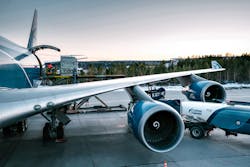Gazprom Neft Triples Volume of Refueling for Aircraft Carrying COVID-19 Medical Aid
Gazpromneft-Aero, the aviation fuel operator subsidiary of Gazprom Neft, has provided an uninterrupted refueling service to aircraft transporting medical cargo across key Trans-Siberian air transport hubs to help combat COVID-19. Tolmachevo (Novosibirsk) and Yemelyanovo (Krasnoyarsk) have become the main international airports for technical stopovers required by airlines transporting medical supplies from Asia to Europe and Russia. According to March 2020 results, the volume of Gazpromneft-Aero aviation fuel to cargo airlines at Tolmachevo and Yemelyanovo airports has increased threefold.
Gazpromneft-Aero’s fueling complex in Novosibirsk has provided ‘wing tip’ refueling services to over 90 flights a week for Volga Dnepr, CAL Cargo Airlines, CargoLux, Lufthansa Cargo, ASL Airlines Belgium, Silk Way West and others. Additionally, the company has refueled Air Bridge Cargo aircraft at Krasnoyarsk.
Gazpromneft-Aero has also increased the refueling volume of Volga-Dnepr aircraft overseas by 30% to over 3 thousand tons per month amid increasing demand for the transportation of medical goods. Volga-Dnepr aircraft are refueled in partnership with direct fuel suppliers at international airports in Hanoi (Vietnam), Delhi (India), Johor Bahru (Malaysia), as well as across seven industrial centers in China.
Vladimir Yegorov, CEO of Gazpromneft-Aero said: “We are ready to provide round-the-clock refueling services to Russian and international airlines operating long-haul aircraft. We undertake the most stringent measures throughout the refueling process to prevent the spread of COVID-19. All employees working at the refueling facilities undergo medical check-ups and are provided with medical masks, gloves and individual sanitizers. After each refueling, airfield tankers undergo the required disinfection procedures. Our refueling facilities fully comply with IATA’s international fuel supply requirements.”
